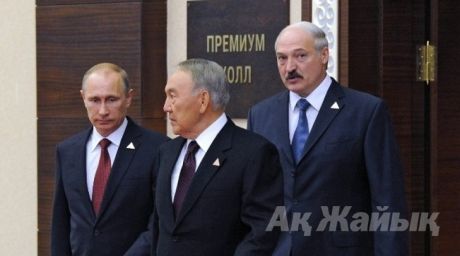 Russian President Vladimir Putin (L), his Kazakh counterpart Nursultan Nazarbayev (C) and Belarussian President Alexander Lukashenko (Photo:AFP) Today, on May 29 Astana will host the meeting of the Supreme Eurasian Economic Council at the level of heads of states of the three countries – the President of Kazakhstan Nursultan Nazarbayev, the President of Russia Vladimir Putin and the President of Belarus Alexander Lukashenko, bnews.kz reports.
Russian President Vladimir Putin (L), his Kazakh counterpart Nursultan Nazarbayev (C) and Belarussian President Alexander Lukashenko (Photo:AFP) Today, on May 29 Astana will host the meeting of the Supreme Eurasian Economic Council at the level of heads of states of the three countries – the President of Kazakhstan Nursultan Nazarbayev, the President of Russia Vladimir Putin and the President of Belarus Alexander Lukashenko, bnews.kz reports.
During the meeting it is planned to sign the Contracts on creation of the Euroasian Economic Union by the heads of the three countries - Kazakhstan, Russia and Belarus.
As a whole the document consists of 4 parts, 28 sections, 118 articles and 32 appendices (in total about 700 pages).
It is expected that EEU will begin its work since January 1, 2015.
The document has the contract and legal base of the Customs Union and the Common Economic Space which existing rules were optimized, improved and brought into accord with rules of the WTO. During the work on the Contract withdrawals and the barriers disturbing to free movement of goods, services, the capitals and labor were cardinally reduced.
The contract on EEU consists of two parts. In the first - institutional - strategic objectives and problems of the Euroasian integration are stated, legal status of the union as full-scale international organization is defined. The basic principles of its activity - cooperation on a mutually advantageous basis for rapprochement of economy of "three", their harmonious development and competitiveness strengthening are formulated. The system of bodies of the union is installed: The supreme Eurasian Economic Council (level of heads of states), Euroasian intergovernmental council (level of heads of governments), Euroasian economic commission and EEU Court. Competence, order of formation and work of each of the mentioned bodies makes a reservation.
In functional part mechanisms of economic interaction are regulated, and also concrete obligations for the branch directions of integration are recorded. Among them uniform policy in the field of tariff and non-tariff regulation, transport and the industry, coordination of agricultural policy (including standardization of the requirements connected with development of export of products of agricultural industry). The basic principles and rules of a competition and antimonopoly policy are recorded. Steps are determined by creation of the common financial market and exchange space, ensuring the guaranteed and effective protection of the rights and legitimate interests of consumers of financial services. The separate block fixed provisions on stage-by-stage integration of the energy markets and activity coordination in the field of power industry, gas and oil products.
EEU creation, according to experts, will promote reduction of prices of goods thanks to reduction of expenses for transportation of necessary raw materials/export of the ready goods, stimulation of the "healthy" competition in a common market of EEU at the expense of equal level of economic development, and also to increase in the competition in a common market of member countries of the Customs Union thanks to occurrence on the market of new prticipants from the general space and many other things.
May 29 2014, 10:15
 Russian President Vladimir Putin (L), his Kazakh counterpart Nursultan Nazarbayev (C) and Belarussian President Alexander Lukashenko (Photo:AFP) Today, on May 29 Astana will host the meeting of the Supreme Eurasian Economic Council at the level of heads of states of the three countries – the President of Kazakhstan Nursultan Nazarbayev, the President of Russia Vladimir Putin and the President of Belarus Alexander Lukashenko, bnews.kz reports.
Russian President Vladimir Putin (L), his Kazakh counterpart Nursultan Nazarbayev (C) and Belarussian President Alexander Lukashenko (Photo:AFP) Today, on May 29 Astana will host the meeting of the Supreme Eurasian Economic Council at the level of heads of states of the three countries – the President of Kazakhstan Nursultan Nazarbayev, the President of Russia Vladimir Putin and the President of Belarus Alexander Lukashenko, bnews.kz reports. В Атырау -10
В Атырау -10